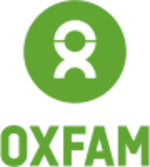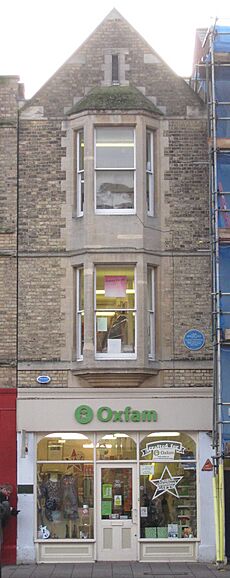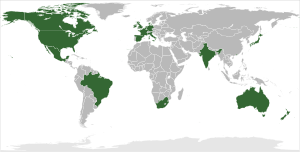Oxfam facts for kids
 |
|
| Named after | Oxford Committee for Famine Relief |
|---|---|
| Founded | 5 October 1942 |
| Founded at | Oxford, England, United Kingdom |
| Type | International NGO |
| Registration no. | 202918 |
| Focus | Poverty eradication Disaster relief Advocacy Policy research Migration advocacy |
| Headquarters | Nairobi, Kenya |
|
Area served
|
Worldwide |
|
Director
|
Gabriela Bucher |
| Jemilah Mahmood (Chair) | |
Oxfam is a British-founded confederation of 21 independent non-governmental organizations NGOs, focusing on the alleviation of global poverty, founded in 1942 and led by Oxfam International. It began as the Oxford Committee for Famine Relief in Oxford, UK, in 1942, to alleviate World War Two related hunger and continued in the aftermath of the war. By 1970, Oxfam had established an international presence, in India, Australia, Denmark, and North America.
Since 2005, Oxfam International has been involved in a series of controversies as it expanded, especially concerning its operations in Haiti and Chad. There have been criticisms of its management of operations in the UK as well.
History

Founded at 17 Broad Street, Oxford, as the Oxford Committee for Famine Relief by a group of Quakers, social activists, and Oxford academics in 1942 and registered in accordance with UK law in 1943, the original committee was a group of concerned citizens, including Henry Gillett (a prominent local Quaker), Theodore Richard Milford, Gilbert Murray and his wife Mary, Cecil Jackson-Cole, and Alan Pim. The committee met in the Old Library of University Church of St Mary the Virgin, Oxford, for the first time in 1942, and its aim was to help starving citizens of occupied Greece, a famine caused by the Axis occupation of Greece and Allied naval blockades and to persuade the British government to allow food relief through the blockade. The Oxford committee was one of several local committees formed in support of the National Famine Relief Committee.
The first permanent Oxfam gift shop was on Broad Street, Oxford; it opened in 1947. Oxfam's first paid employee was Joe Mitty, who began working at the Oxfam shop on Broad Street, Oxford, on 9 November 1949. Engaged to manage the accounts and distribute donated clothing, he originated the policy of selling anything people were willing to donate, and developed the shop into a national chain.
Fundraising innovations led by advertising adviser Harold Sumption, including rigorous testing of advertising campaigns, direct mail, the trading catalogue, and the first multimedia fundraising campaign the "Hunger £ Million", helped Oxfam become, for a time, the largest charity in the UK. By 1960, it was an international nongovernmental aid organization. The first overseas committee was founded in Canada in 1963, and in 1965, the organization changed its name to its telegraphic address, OXFAM. The Oxford committee became known as Oxfam GB. In 1995 Oxfam International was formed by a group of independent non-governmental organizations. Stichting Oxfam International was registered as a non-profit foundation at The Hague, Netherlands, in 1996.
Winnie Byanyima was the executive director of Oxfam International from 2013 to 2019.
Oxfam's work
Focus
Oxfam has provided relief services during various global crises, including the Israeli–Palestinian conflict, North Korean famine, 2011 East Africa drought, 2012 Sahel drought, Nepal earthquake, and Yemeni crisis. The Bosfam NGO was also founded in May 1995 by women participating in an Oxfam GB psychosocial 'radionice' project to support internally displaced women during the Bosnian war. Oxfam has become a globally recognized leader in providing water sanitation to impoverished and war-torn areas the world over. In 2012, Oxfam became one of the humanitarian groups that comprise the UK's Rapid Response Facility to ensure clean water in the wake of humanitarian disasters.
A January 2014 Oxfam report stated that the 85 wealthiest individuals in the world have a combined wealth equal to that of the bottom 50% of the world's population, or about 3.5 billion people. More recently, in January 2015, Oxfam reported that the wealthiest 1 percent will own more than half of the global wealth by 2016. An Oxfam report released in 2017 stated that eight billionaires possess the same amount of wealth as the poorest half of humanity.
Campaigns
The Make Trade Fair campaign organized by Oxfam International focuses on the elimination of trade practices, such as dumping, which occurs when highly subsidized, surplus commodities from developed countries such as rice, cotton, corn, and sugar are sold at low prices and farmers from poor countries have difficulty competing. Another practice Oxfam opposes is the setting of tariffs, where nations enforce high taxes on imported goods, restricting the sales of products from other nations, unbalanced labour rights for women, who often earn lower wages than their male counterparts, and stringent patent issues that prevent the prices of medication, software, and textbooks (e.g. gene patents, chemical patents, and software patents) from being lowered. Thus, such essential goods are often inaccessible to developing nations.
As part of its work Oxfam has also campaigned on issues regarding coffee farming. In October 2006, Oxfam accused Starbucks of asking the National Coffee Association (NCA) to block a US trademark application from Ethiopia for three of the country's coffee beans, Sidamo, Harar and Yirgacheffe. They claimed this could result in denying Ethiopian coffee farmers potential annual earnings of up to £47m. Following this Starbucks had placed pamphlets in its stores accusing Oxfam of "misleading behavior" and insisting that its "campaign need[s] to stop", while The Economist derided Oxfam's "simplistic" stance and Ethiopia's "economically illiterate" government, arguing that Starbucks' (and Illy's) standards-based approach would ultimately benefit farmers more. In June 2007, Ethiopian Government representatives and senior leaders from Starbucks Coffee Company worked out an agreement regarding distribution, marketing and licensing that recognized the importance and integrity of Ethiopia's specialty coffee designations. An Oxfam spokesman said the deal sounds like a "useful step" as long as farmers are benefiting, and a big step from a year prior when Starbucks "wasn't engaging directly (with) Ethiopians on adding value to their coffee".
Shops
Oxfam has shops all over the world, which sell many fair-trade and donated items since their first charity shop opened in 1948, although trading began in 1947. The proceeds from these are used to further Oxfam's mission and relief efforts around the globe. Much of their stock comes from public donations but as of 2012 they still sold fair trade products from developing countries in Africa, Asia and South America, including handcrafts, books, music CDs and instruments, clothing, toys, food, and ethnic creations. These objects are brought to the public through fair trade to help boost the quality of life of their producers and surrounding communities.
As of 2010, Oxfam had over 1,200 shops worldwide. More than half of them were in the UK, with around 750 Oxfam GB shops, including specialist shops such as books, music, furniture, and bridal wear. Oxfam Germany has 45 shops, including specialist book shops; Oxfam France shops sell books and fair-trade products, and Oxfam Hong Kong has two shops selling donated goods and fair-trade products. Oxfam Novib, Oxfam Australia (with over 20 fair trade shops), Oxfam Ireland and Oxfam in Belgium also raise funds from shops.
Of the Oxfam charity shops around the UK, around 100 are specialist bookshops or book and music shops. Oxfam is the largest retailer of second-hand books in Europe, selling around 12 million per year. In 2008, Oxfam GB worked with over 20,000 volunteers in shops across the UK, raising £17.1 million for Oxfam's programme work.
In 2018, CEO Mark Goldring admitted closures of some Oxfam shops were likely. Sector press later reported that Oxfam closed 26 of its shops in 2020 and that shops made an operational loss of £12.9 million in 2020, with further closures reported in local media thereafter.
Fundraising
Oxfam has several successful fundraising channels in addition to its shops. Over half a million people in the UK make a regular financial contribution to its work. In April 2017, the Information Commissioner's Office fined Oxfam charities for breaching the Data Protection Act by misusing donors' personal data. Oxfam was fined £6,000.
Offices and affiliates
Oxfam International consists of 21 affiliates and the international secretariat in Nairobi. Additional offices were in Addis Ababa, Washington, DC, New York City, Brussels, and Geneva.
| Affiliates | Country/Region | Established | Full affiliate since |
|---|---|---|---|
| Oxfam America | 1970 | 1995 | |
| Oxfam Australia | 1954 (as Food for Peace Campaign) | 1995 | |
| Oxfam Belgique/ Oxfam België | 1964 | 1995 | |
| Oxfam Canada | 1966 | 1995 | |
| Oxfam Colombia | 2020 | Observer | |
| Oxfam France | 1988 | 2006 | |
| Oxfam Germany | 1995 | 2003 | |
| Oxfam GB | 1942 | 1995 | |
| Oxfam Hong Kong | 1976 | 1995 | |
| Oxfam Denmark | 1966 (as World University Service, WUS) | 2015 | |
| Oxfam Italia | 1976 (as Ucodep) | 2012 | |
| Oxfam Intermón | 1956 (as Intermón) | 1997 | |
| Oxfam India | 2008 | 2011 | |
| Oxfam Ireland | 1971 (as Oxfam Northern Ireland) | 1998 | |
| Oxfam Mexico | 1996 | 2008 | |
| Oxfam New Zealand | 1991 | 1995 | |
| Oxfam Novib | 1956 (as Novib) | 1995 | |
| Oxfam Québec | 1973 | 1995 | |
| Oxfam South Africa | 2013 | 2016 |
Oxfam Japan was a member from 2003 until its closure in 2018.
Oxfam International
The Oxfam International Secretariat (OIS) leads, facilitates, and supports collaboration between the Oxfam affiliates. The OIS Board comprises the executive director, chair of each affiliate, and the OI chair. The affiliates' chairs are voting members and are not remunerated. The executive directors and the OI Chair are all non-voting members. The board also elects the deputy chair and treasurer from among its voting members. The board is responsible for ensuring that Oxfam International is accountable, transparent, and fit for purpose. In 2009–10, it had about 77 staff (including secondment placements and temporary staff). It is funded by contributions from affiliate organizations and has an operating budget of US$8.7M. The legal name of the entity is Stichting Oxfam International.
Oxfam America
In 1970, Oxfam America became an independent nonprofit organization and an Oxfam affiliate in response to the humanitarian crisis created by the fight for independence in Bangladesh. Oxfam America's headquarters are located in Boston, Massachusetts, with a policy and campaigns office in Washington, D.C., and seven regional offices around the world. A registered 501(c)3 organization, Oxfam America campaigns for climate change adaptation, food security, aid reform, access to medicines, and fair trade. Ray Offenheiser served as the president and CEO of Oxfam America from 1996 until 2016. As of 2017, the president and CEO is Abby Maxman.
Oxfam Australia
Oxfam Australia is an independent, not-for-profit, secular, community-based aid and development organization, and an affiliate of Oxfam International.
Oxfam Denmark
Oxfam Denmark has its roots in the Danish department of World University Service and has been active since the 1966 (initially mainly against apartheid and similar situations in other southern African nations). Since the 1970s, it mainly worked with projects in Africa and Latin America, and usually focused on democracy, education and the causes of poverty. In 1991, the affiliate broke loose and founded the independent organization IBIS, International Bistand International Solidaritet (in English: 'International Aid International Solidarity'), and was mainly involved with transformative education, inequality, women's rights and democracy. In 2015 IBIS became a member of Oxfam. Around the same time, the name was modified from IBIS to Oxfam IBIS, and in 2023 they made the complete transition and changed its name again to Oxfam Denmark. Today the organization mainly focus on transformative education, climate justice, economic justice and humanitarian aid.
Oxfam GB (Great Britain)

Oxfam GB's headquarters are in Cowley, Oxford. The finance office is in Newcastle, from where Oxfam shops are managed. Oxfam GB had a total income of £408.6m in 2016/17, had 5,000 employees, and used the services of 23,000 volunteers. In 2016 it received £31.7m from the British government.
Mark Goldring was the chief executive officer from 2013 until January 2019, followed by Dhananjayan (Danny) Sriskandarajah who held office from January 2019 until December 2023. Halima Begum was announced as his successor as chief executive officer in December 2023.
Oxfam GB produces a regular supporter magazine called "Voices".
Oxfam India
Oxfam's involvement in India began when money was granted in 1951 to fight famine in Bihar. Bihar at the time was one of the poorest and most populated states in India.
Oxfam had launched an appeal that led to the first report of Oxfam's work in the House of Commons in UK. On 31 May 1951, Secretary of State for Commonwealth Relations had commended the Bihar appeal, stating "the Oxford Committee for Famine Relief has made an appeal for donations and I hope individuals will reply to that generously". Among the many donations received was one for 100 British pounds from an Indian Rajah in appreciation of what Oxfam was doing for the hungry of his country.
Bihar and famine would bring Oxfam back to India in 1965 to address drought due to bad monsoons. Bihar held a population of 53 million, of which 40 million relied on subsistence farming to live. This would compound for India in the future; production of food had not been parallel to its exploding population. It is estimated that, over the course of the droughts and famines, 2,400 tons of milk was bought by Oxfam and at the height of this was feeding over 400,000 children and mothers. In 1968 Oxfam's first field director in India, Jim Howard, created the Oxfam Gramdan Action Programme, or OGAP. This was the first joint rural development programme in Oxfam and the first step to a new 'operational' Oxfam. Oxfam India was established on 1 September 2008 under section 25 of the Companies Act, 1956 as a non-profitable organization with its head office in Delhi and is now a member of Oxfam International Confederation. This was marked by Oxfam's 60th year in India.
Effective from 1 January 2022, Oxfam lost its foreign-funding license registration under the Foreign Contribution Regulation Act (FCRA) which is mandatory for charities, NGOs and any non-profit organisations receiving foreign funding in India along with 6,000 other such organisations.
Oxfam New Zealand
Oxfam New Zealand is an aid and development organization and affiliate of Oxfam International. Oxfam NZ is also responsible for delivering Cyclone relief in several countries in the Pacific region. Oxfam New Zealand's work is made possible by supporters, interns, staff, volunteers, board and overseas partners. Most of the staff are based in their Auckland office. They also have a policy unit in Wellington. Most of Oxfam New Zealand's funds come from donations, supplemented by New Zealand government funds.
Awards and nominations
In January 2013, Oxfam was nominated for the Charity of the Year award at the British Muslim Awards.
See also
 In Spanish: Oxfam para niños
In Spanish: Oxfam para niños
- 2007–08 world food price crisis
- Global Hunger Index
- Integrated Food Security Phase Classification
- Millennium Development Goals (Goal 1)
- Make Trade Fair
- Ox-Tales
- Universal Declaration on the Eradication of Hunger and Malnutrition (1974)
 | Isaac Myers |
 | D. Hamilton Jackson |
 | A. Philip Randolph |




